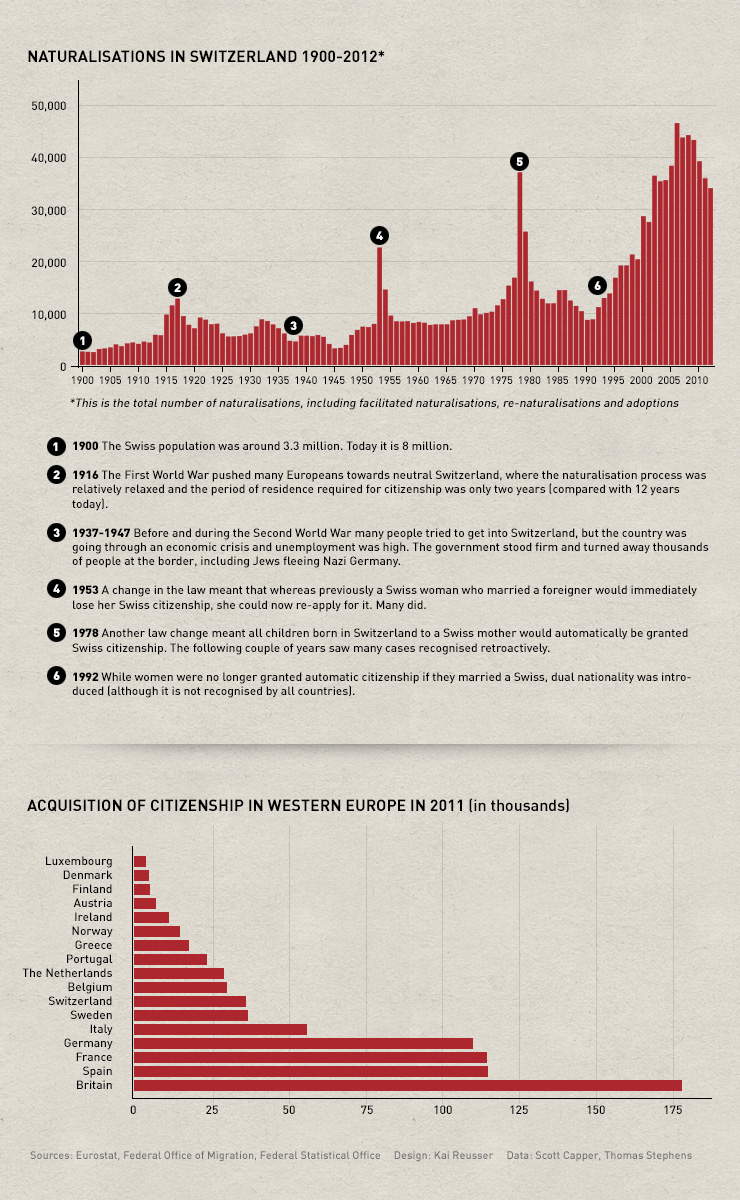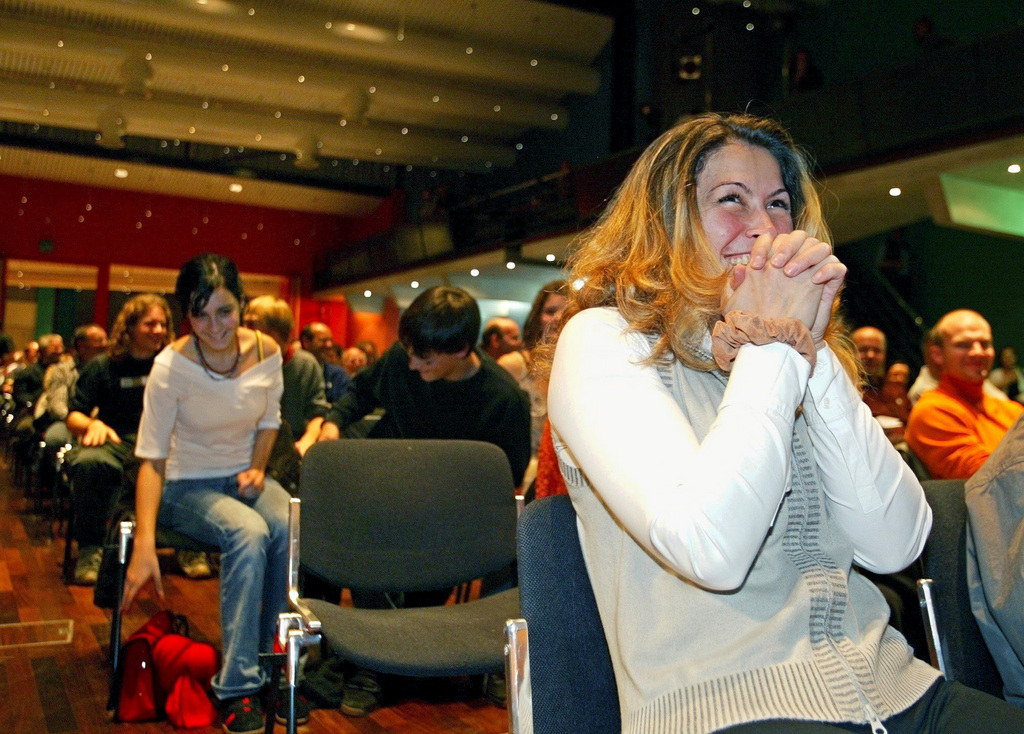‘In my heart I’m still Swiss’

Religious persecution, famine, population booms and jobs – throughout history Swiss citizens have started new lives abroad for a wide range of reasons. Do they become dual nationals, and if so, why and how Swiss do they remain?
Ten of the more than 700,000 Swiss who currently live abroad – some in booming cities, others on remote exotic islands – tell swissinfo.ch about their experiences, emotions and motivations.
Some had applied for citizenship abroad for love, others for practical reasons such as not being able to enrol in professional training without it.
But the overall feeling, as summed up by Marthe Lindsay, who moved to Britain in the 1970s, was that “becoming a citizen of another country cannot change the fact that you remain above all a Swiss at heart”.
Similarly, most respondents reckoned that if they had been forced to give up their Swiss passport – something few countries require – they would have had to think long and hard about whether to take the plunge.
When Sophie Lüssi, a successful jazz violinist from Zurich, was applying for citizenship in Buenos Aires, the form said she would have to give up her Swiss passport – “something I’d never do”.
“While filling out the paperwork: I put a cross through that box – and I was granted Argentinian citizenship without having to forgo my Swiss one.” Argentina has allowed dual citizenship since July 2010.
Note to readers
It is possible that the naturalisation laws mentioned here have changed over the years. Many of the comments were gathered through a request on SwissCommunity.org, an online platform for Swiss people living abroad. We would like to extend our thanks to everyone who participated.
Career move
“In my heart I’m still Swiss, but after spending 46 years in New Zealand I’m also proud of being a citizen of this country – and my dual citizenship,” said Bern-born Erika Currie, who arrived in New Zealand in 1967 under the assisted immigration scheme, which gave her permanent residency.
After four years, she was entitled to apply for citizenship. Her formal naturalisation ceremony took place in 1973 in Wellington and she was allowed to keep her Swiss passport.
Of the 715,710 Swiss who currently live abroad (including dual nationals, see box), New Zealand is home to 6,805, according to foreign ministry figures for 2012.
“I took this step because I planned to work and remain in New Zealand long term and to participate in the political life of my host country. It was also advantageous to my career, as with a Swiss passport it would have been very difficult to make frequent business [trips] to Australia, usually at short notice, as I would have had to obtain a re-entry permit before travelling.”
Oath of allegiance
Katharina Allen, originally from Zurich, became a Canadian citizen after living in the country for ten years, also for employment reasons.
“At the time, foreign nationals couldn’t enrol in a teacher’s college and since that was my chosen profession, I was obliged to conform,” she said.
“It was a very simple process comprising an oath of allegiance to my adopted country. Swiss citizenship was retained without question.”
Allen’s parents have lived in Canada – whose Swiss community totals 38,959 – for over 40 years without taking steps to become citizens. Some of her siblings still don’t have a Canadian passport – not a problem, she says.
“Their contributions to and love for Canada are not diminished by the fact that they have never formally acknowledged their loyalty.”

More
Naturalisations in Switzerland
Duty and commitment
Loyalty and duty are common themes among respondents.
“I believe that if you migrate to another country, it is only fair to be a citizen and do your duty as such,” said Claudia Stillhard, who applied for Australian citizenship after living in the country on a permanent resident visa for two years.
A further advantage, she said, was that her children were automatically Australian.
“We’re lucky that Australia allows dual citizenship and therefore it was not such a hard question. If I would have had to give up my Swiss heritage, I’m not so sure I could do that.”
Roland Isler also wasted no time after living for two years in Australia – current Swiss community 23,632. “Unlike in Switzerland, where every foreigner wanting to become a Swiss citizen is looked at with suspicion, people who settle in Australia are encouraged to make a commitment to their adopted country,” he said.
“The willingness to make such a commitment was my driving force to become a citizen, to be able to participate in the political life of the country, but also to be able to travel freely in and out of the country without having to rely on a re-entry permit.”
He said he often asks himself whether he would have done it if it had meant losing his Swiss citizenship. “I don’t know the answer to that – I’m just glad I never had to make that choice.”
Almost 716,000 Swiss citizens live outside Switzerland. The trend observed for several years continued in 2012, according to figures released by the foreign ministry in January 2013.
The number of Swiss abroad increased by 1.72 per cent, going from 703,640 in 2011 to 715,710 in 2012. More than half of these live in Europe (442,620), with the most popular countries being neighbouring France (186,615), Germany (80,715) and Italy (50,091).
Outside Europe, the United States is the top destination, with 76,330 domiciled there. Israel is home to 15,970 Swiss – a jump of 21.44 per cent since 2007.
At the other end of the list, only one Swiss citizen lives in each of São Tomé and Principe, an island nation off the western coast of Central Africa, Kiribati, an island nation in the Pacific Ocean, and Micronesia.
The population of Switzerland reached eight million in 2012, but around 20 per cent of people living in the country do not have Swiss citizenship.
In 2011 – the latest year for such statistics – just under 30,000 Swiss left Switzerland. Some 24,000 returned to Switzerland (see ‘net migration’ link).
Red tape
“We are Swiss and remain Swiss!” wrote Petero Koerber from French Polynesia, home to seven other Swiss. “Not only because of our red passport but also because Switzerland will always remain our homeland in our hearts.”
Koerber says he became a naturalised citizen for many reasons, one being assimilation, which for him also means accepting rights and duties. But there was also the dreaded red tape jungle for non-citizens.
“As in most countries, foreigners have to periodically apply for residency permits, which, depending on the country, can be a bureaucratic nightmare. There comes a point when you could do without that,” he said.
“Plus you’re never sure whether one day the answer will actually be ‘no’ and you have to suddenly leave – even if you’ve lived in the country for years. And obviously you have to pay for all this.”
All this, he said, makes most people think of naturalisation sooner or later. French Polynesia is governed by French law – albeit with a few tweaks – and coming from a country where French is an official language, like Switzerland, one can get naturalised after three years instead of five.
“A year or two after applying, you go to the local police station to see whether you can hold a conversation in French, and then, several months later, you get summoned back to the police station to pick up various documents. You have no idea what they are – it’s only at home that you see the letter with the French president’s signature: you’re now a French citizen!”
He was disappointed though that whereas in France “the official shakes your hand over a glass of wine, that doesn’t happen here”.
Swearing allegiance
Fred Peyer originally thought the naturalisation process had been complicated in Hawaii, but after reading Koerber’s experience he said it was in fact “child’s play”: three months, $700 (CHF650) and a nice party.
Peyer left Switzerland aged 24 and became a Canadian citizen after living in Montreal for five years. He described an amusing experience with the interviewing judge.
“As soon as she saw I was from Switzerland, she started telling me about her recent holiday there. She was all excited and kept on talking for quite a while until she suddenly said: ‘Oh, I’m supposed to ask you some questions. Who is the Prime Minister?’ I answered ‘Trudeau’ and that was it, I had passed the interview!”
After 16 years in Canada, he moved to Hawaii – Swiss community 704. He became a US citizen two years ago after living there for 22 years on a Green Card. He could still keep his Swiss passport, “but had to swear allegiance to the United States”.
“The main reason was that the Green Card is a privilege, not a right. It can therefore be taken away at any time for whatever reason. My children are here in the US and at 65 I won’t be emigrating anywhere else anymore, so by becoming a US citizen I made sure I couldn’t be ‘deported’ for any reason,” he said.

More
Young Swiss living abroad renew their ties with their parents’ home country
Cookies and punch
The naturalisation process in the mainland United States in the early 1990s was more complicated for Elisabeth Perlman – who had to deny she was a Nazi!
“I don’t recall the exact length of the overall time [it took], but I think it was less than a year. I do remember that in the application forms I had to say that I was never a member of the Nazi party or of the Communist party and that I would defend the US in case of war – which means you could get drafted if you were the right age.”
She said the citizenship test – a one-on-one oral exam – consisted of ten questions, all from a booklet the government had sent her to study. “For the English exam I had to write down the following sentence: ‘I am looking forward to becoming a US citizen soon’.”
Perlman could keep her Swiss passport, but in the US government’s eyes she is exclusively an American citizen. Last year, 76,330 Swiss lived in the United States.
“The swearing-in ceremony was a while later at the local courthouse and very formal with pledge of allegiance etc. But afterwards we – there were about 100 of us – were greeted by nice volunteers with cookies and punch, plus we were handed a little American flag and solicited to sign up for one of the two big political parties.”
Not just passing through
Isabel Golay was born in Morocco to two Swiss parents but has lived in Argentina since 1980.
For her, having an Argentinian passport is linked to values. “I live here, I get involved here, I have a commitment to Argentinian society – I am a part of it, not just a bird of passage,” she said.
“I usually say that my life’s like a tree whose roots are in Switzerland, whose branches are spreading out in Argentina and whose fruit will hopefully be for everyone.”

In compliance with the JTI standards
More: SWI swissinfo.ch certified by the Journalism Trust Initiative










You can find an overview of ongoing debates with our journalists here . Please join us!
If you want to start a conversation about a topic raised in this article or want to report factual errors, email us at english@swissinfo.ch.